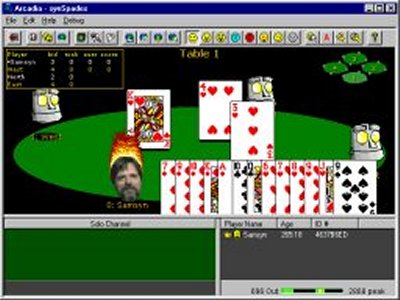 |
| synSpades |
How to Play
Rules of Spades
Toy Status
Community:
Forums
Java Chat
Firewall/Router Help
Arcadia Toys:
Collaboration
DomiNation
Empyrion
synChess
synJam
synJet
synPool
synSpades
synSpace
synVille
synVideo
Turnabout
Other
Games:
Well of Souls
Warpath
Rocket Club
Developers:
TurnAbout API
New Parks
New WoS Worlds
Rocket Club
Models
Company:
Synthetic Reality
Golden Souls
Donate $
Contact Us
| synSpades is one of the toys which
can be played in Arcadia. It is a multiplayer
card game. The card game itself is for four
players, but each synSpades server hosts 4
tables, so up to 16 people may play at the same
time, while others are spectators.
|
How To Play: synSpades works like most Arcadian toys in that you first must find or create a server which is hosting the game. (Or play in solo mode, of course). Once there, you will see a table in the foreground, a table selector in the upper right, and a score panel in the upper left.
After that,
you're playing the card game "Spades"
whose rules are recapped here. There are some
rule variations allowed, and you can review them
by pressing the "Toy Options" button on
the Arcadia tool bar. Spades is
actually a very simple game, and easy to play. Of
course, you won't believe this after having read
my convoluted attempt at describing the rules
here. Also, there are many variations allowed in
the game (many of which are supported in this
program as options selected by the host of the
game). The Deal Spades is played
with four players and a deck of 52 cards. Players
earn points according to a horribly complicated
scheme. The first player to reach the winning
score (usually 300 points) is the winner. Along
the way it is possible to lose points. In fact,
it is quite possible to accumulate negative
points. And, in fact, people seem to have the
most fun when they are forcing YOU to have
negative points! The Bid However, here is
where it starts to get interesting. Before
playing the first trick of the round, each player
looks at his or her cards and makes a 'bid' as to
how many tricks they think they can take. (For
example, if you have a lot of high cards, you
might think you can take a lot of tricks, so you
would bid higher.) The number of points you earn
at the end of the round is a function of your bid
and how many tricks you actually take in that
round. Your bid might be anywhere between zero
(This is called bidding NIL and means you think
you can take NO tricks) and 13 (which means you
are incredibly optimistic and/or naive) Overtricks Just to make the
game REALLY tension-inducing, there is a penalty
for taking too many overtricks. You are penalized
one HUNDRED points each time you accumulate 10
overtricks. So if you take 4 overtricks in the
first round, 3 in the next, and 3 in the next,
then you will earn a whopping -100 point penalty.
This is how we make the game last a VERY long
time. So, ideally, it is important to EXACTLY
meet your bid and not to exceed it. Bidding NIL Well.. I can
hear you wondering, what if I bid NIL (0) and am
successful in taking no tricks. This might be
tough, is my reward zero points? NO, because you
will have done something wonderful (especially
considering that your 'friends' will have done
everything in their power to FORCE you to take a
trick), you will receive ONE HUNDRED POINTS! Following The Lead Suit Well, now back
to that statement: "The high card takes the
trick." Well, it isn't QUITE that simple,
but almost. Basically, as we know, a trick
consists of each player selecting a card and
placing it on the table. The FIRST card played in
the trick selects the LEAD suit. Everyone else
has to play cards in the same suit for them to
have a chance to win the trick. If hearts are
'lead', then you MUST play a heart (if you have
one) and the highest ranking heart wins the
trick. If you don't have any cards in the lead
suit, then you can play any suit you do have. Who Takes the Trick? So, for example,
let's say three players have played the Ace,
King, and Queen of diamonds. You don't have any
diamonds. But you DO have the lowly 2 of spades,
which you play. YOU win the trick. Partner Play One of the rules
which the host can change is whether you will
play as partners, or as individuals (as described
above). In Partner play, two pairs of partners
play against each other. Partners always sit
across from each other at the table. Partner play
is usually to 500 points, but the host may select
a different finish score. NIL Bids in Partner Play If one (or both)
partners bid NIL (or BLIND NIL), then their
scores are handled separately for that round, and
then added together at the end of the round. For
example, if one partner bids 3 and the other bids
NIL. Then, during the round the first partner
takes 5, and the other takes none, the first
partner will earn 32 points (30 for the bid, plus
2 overtricks accrued only by that player) and the
second player will earn 100 points (for
successful NIL) and the partnership as a whole
will score 132 points for that round. |
Toy Status: The game is now a complete multiplayer game, though it could stand the application of some more animations, sound effects, and graphical depth. The bots use my patented award-winning NetSpades 'bot AI, which hit the Internet in late 1994 as possibly the first Internet Spades Game. To Install Toys:
|
